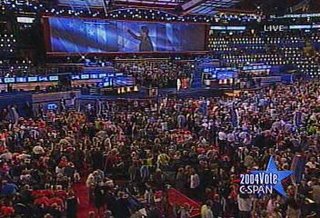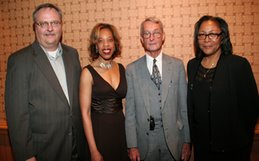
Convention 2008
At our last DNC meeting in Chicago, members attended parties sponsored by the three cities vying for the 2008 DNC Convention: Minneapolis-St.Paul, Denver, and NYC. Since that meeting in Chicago the GOP selected Minneapolis-St. Paul for its '08 convention city so Democrats are now considering Denver and NYC. Personally, I would love to see us go to Denver. The American West is emerging for Democrats and I hope that we capitalize on that trend by selecting Denver. Read this story from yesterday's New York Times about the convention decision.
Democrats Still Weighing Where to Hold ‘08 Convention
By Rachel Kapochunas, New York Times
Democrats with 2008 on their minds will have to wait a bit longer to learn whether their party will hold its presidential nominating convention in Denver or in New York City. While a site selection announcement was widely expected to have been made by now, DNC spokesman Damien LaVera said Wednesday that “a final decision has not been made.”
But LaVera added that party officials likely are not going to put that decision off much longer, stating that the choice of which city will host the convention — to be held Aug. 25-28 in 2008 — is likely to come before Jan. 1.
The Republican National Convention got the jump in the convention sweepstakes in September by naming the Minneapolis-St. Paul metropolis as the location for its 2008 convention, to be held Sept. 1-4.
The Twin Cities also had competed for the Democratic convention, but the GOP’s preemptive move forced the Democrats to drop Minneapolis-St. Paul from its short list of finalists.
That left just New York City — a 2008 also-ran to again host the GOP convention, as it did in 2004 — and Denver in the running for the Democratic convention. A fourth finalist city, New Orleans, dropped its bid in July, citing financial and logistical difficulties.
The Democratic faceoff pits Denver — a relative novice at hosting conventions, but a key city in a fast-growing Mountain West region that increasingly is a partisan battleground — against New York City, one of the most seasoned convention hosts and a Democratic Party stronghold of long standing.
Denver has hosted one convention, exactly 100 years earlier: The Democrats picked William Jennings Bryan of neighboring Nebraska, whose third and final bid as the party’s presidential nominee ended in his defeat by Republican William Howard Taft.
By contrast, New York City has a long hosting history, having been home to five Democratic and the 2004 Republican conventions.
Most of those occurred over the past three decades: The nation’s most populous city hosted the 1976 and 1980 Democratic conventions that nominated Jimmy Carter, the 1992 convention that sent Democrat Bill Clinton to his first White House term, and the 2004 Republican convention at which President Bush was renominated.
Denver officials contend their city is the right choice not only because of its own assets, but because of the potential of a convention in the Mountain West to energize the party in what strategists say will be a crucial area for Democratic growth in future elections.
“It’s a stage that will launch our nominee in a way that sends a message that the Democratic Party is broadening its scope and going to compete very, very strongly in the West,” Debbie Willhite, executive director of the Denver 2008 Convention Host Committee, told CQPolitics.com.
Democrats, whose presidential candidates have for years had to rely mostly on the states of the Northeast, upper Midwest and Pacific Coast for their base of electoral support, are hailing recent gains they say are eroding the Republicans’ longterm and strong grip on the Interior West.
In Colorado alone, Democrat Bill Ritter this year captured the governor’s seat left open by retiring Republican Bill Owens; Democrat Ed Perlmutter won the 7th Congressional District seat that Republican Rep. Bob Beauprez left open to run for governor, a win that gave the Democrats a 4-3 edge in the state’s House delegation; and the party maintained the holds on both chambers of the state legislature that it had won in 2004.
New York hardly has to build up its reputation as a Democratic powerhouse. Although the Republican Party chose to hold its 2004 convention there — a decision made in the aftermath of the Sept. 11, 2001 terrorist attacks on the World Trade Center — the city gave 75 percent of its presidential vote that year to Democratic nominee John Kerry.
New York Sen. Hillary Rodham Clinton and gubernatorial nominee Eliot Spitzer won landslide victories for the Democrats this November, and party pickups of three formerly Republican House seats boosted the Democrats to a 23-6 advantage in the state’s House delegation.
But Willhite, while conceding that New York would probably produce a “great convention,” said “there’s no news” surrounding that selection. Instead, the reaction might be, “Democratic Party goes to New York ... again,” said Willhite.
Many observers expected DNC Chairman Howard Dean, the former governor of Vermont and a contender for the 2004 Democratic presidential nomination, to make a final decision earlier this month. But Willhite said officials in both contending cities are still in the process of finalizing the draft contracts sent to them by the DNC, according to Willhite.
Contracts are likely to include agreements regarding hotel room reservations, transportation, and main convention locations, which would be the Pepsi Center in downtown Denver and Madison Square Garden in the central New York City borough of Manhattan.
One of the biggest questions raised about Denver — especially by those favoring a pick of New York City — is whether the Western city really has the accomodations needed to host the convention. New York City, population 8 million, is a tourist magnet. Denver, population 555,000, is much less so.
But Denver’s host committee, which estimates that the convention will draw 35,000 visitors, states that they are currently holding nearly 19,000 hotel rooms for participants. The committee’s Web site boasts an expected $150 to $200 million in “economic benefits” gained from hosting the convention.
Meanwhile, the Republican National Committee is expected to ratify its site selection committee’s choice of Minneapolis-St. Paul at its winter meeting in Washington next month.
© 2006 Congressional Quarterl

No comments:
Post a Comment